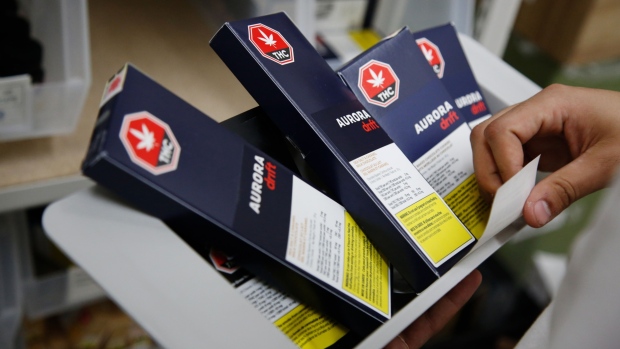May 15, 2020
Canadians shifting away from stockpiling cannabis amid COVID-19, executives say
, The Canadian Press

TORONTO -- Canadians have slowed their buying frenzy when purchasing pot amid the pandemic, said cannabis company executives.
Aurora Cannabis Inc. noticed the COVID-19 boom in cannabis sales dissipating, said Michael Singer, interim chief executive.
"There was a kind of pantry-loading in late March, when there was a concern that maybe the supply chain would be closing down and whether cannabis as an industry would be deemed essential," he said.
After the industry was deemed an essential service in several provinces, he said, things went back down to pre-pandemic levels in April.
"The behaviours were very similar to before that pantry-loading process at the end of March."
In Aurora's third quarter, which ended on March 31 and encompassed the first weeks many Canadians spent working from home as well as physical distancing, the Edmonton-based company sold 12,729 kilograms of cannabis, amounting to 39 per cent more than the quarter before.
That spike was also seen in March and April by provincial pot distributors Ontario Cannabis Store and Societe quebecoise du cannabis.
The SQDC declined to say how sizable their increase was, but the OCS said in mid-April that its online orders tripled since COVID-19 started to unfold across the country.
The OCS received between 2,500 and 3,500 orders prior to March 9. In the weeks after mass adoption of physical distancing, those orders doubled to 5,000. Orders doubled again, topping out at 13,000 in one particular week.
"While it is likely there was some stockpiling, orders have maintained at the 5,000+ orders per day level; still much higher than before COVID-19. Many products, including edibles and seeds, continue to sell quickly," Daffyd Roderick, the OCS's director of communications, wrote in an email.
SQDC spokesperson Fabrice Giguere wouldn't say Friday if the distributor has since seen a decrease.
The initial spike and COVID-19 posed challenges for the cannabis industry, which was already grappling with mass layoffs, the rollout of edibles and executive shakeups.
Aurora reorganized facility layouts, adjusted worker schedules, gave some staff bonus pay, added extra health screening measures and rolled out the use of personal protective equipment.
The company also pushed the government for relief and to be named an essential service.
Aurora's lobbying hasn't ended because "you always want more and what we want is to be treated fairly," said Singer.
Meanwhile, cannabis distributors in several provinces, including Ontario and Alberta, warned of delivery delays because of the increase in orders. The OCS staffed up and expanded its courier offerings to accommodate the interest in cannabis.
A flurry of business during the pandemic prompted Winnipeg-based cannabis chain Delta 9 Cannabis Inc. to hire 76 new employees, said John Arbuthnot. That's a roughly 30 per cent increase for his workforce.
Foot traffic at his stores is still high and cart sizes have increased, but there has been a change in consumer attitude, he said.
"Certainly we are seeing that the sentiment from customers in store has shifted from, 'Oh my goodness, I need to make a last large purchase,' to more of just back to business as usual. But it seems, for us, that the uptick in business has been continuing," he said.
Delta hasn't seen a drop in sales or demand even though people aren't stock piling because more edibles and novel products are making their way to shelves and the price of cannabis is sliding, he said.
"We are getting to a point where the prices of these products start to become quite competitive with what people were perhaps used to on the black market," he said.
"We're finally starting to put more of a dent in those customers that were previously continuing to access the black market."





